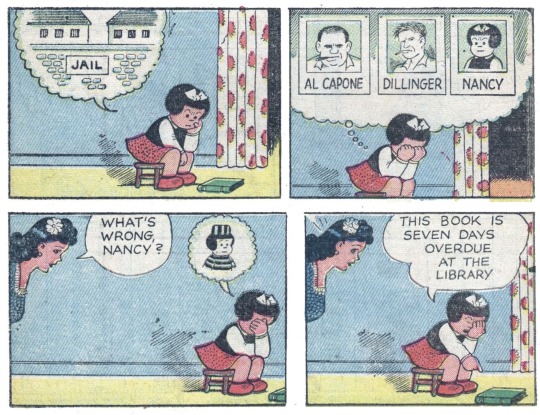Don't wanna be here? Send us removal request.
Text
Junji Ito's Frankenstein adds a great little extra to the original Mary Shelley story: The monster's bride is horrified by him too, and even tries to fight him.
The monster blames Frankenstein, thinking it was a trap. It wasn't. He just never considered she might not want to be with him.
56 notes
·
View notes
Text

The Sketch, London, February 7, 1912
14K notes
·
View notes
Text
getting older as a kid is like yippee!! wahoo yay!! but then immediately as u enter ur early twenties ur like whoa lol hold on wait wait hold upa minute stop
83K notes
·
View notes
Text

we're never making it out of this cave. im so tired its so dark in here can anyone hear me
13K notes
·
View notes
Text
people are literally so boring a male character will kill 10000 people and steal candy from babies and theyll be like omg thats my king! but a female character is rude once and theyre like i hope she dies violently
136K notes
·
View notes
Text
Yall sleeping on this Sam L. Jackson interview about trump lmfao.

176K notes
·
View notes
Text

It's a heist. Elon is the fraud. DOGE is the fraud. The coders destroying databases are the waste.
11K notes
·
View notes
Text










Beautiful Street Art in Hollywood. Walk of shame. By the way .....FUCK DONALD TRUMP!
117K notes
·
View notes
Text
151K notes
·
View notes
Text
As a Hamlet apologist I support Laertes right to just fucking stab Hamlet. "Aha I'm sooooo sorry that I killed your father drove your sister to suicide and then (!!!!) yelled at you for grieving told you your love for her could never match mine and fought with you literally over her dead body 😬😬 BUT 👉👈 don't we all have our lil' mental health days sometimes??" I would go so far as to say that Hamlet gave him no other option.
348 notes
·
View notes
Text

shame that this guy died in the first century because i'd love to hang out with him
1K notes
·
View notes
Text
Let Your Knights Weep
One of the big things I've had to train myself out of when writing medieval historical fiction?
The stiff upper lip.
This used to really bewilder my editor, who for some time attempted to nudge me away from having my grown men weep and wail and blubber, but for me it's an essential part of the setting. Whether in grief or fear, medieval people did not hold things back.
Here are some of my favourite quotes to explain.
First, a couple from two great 20th century medievalists:
CS Lewis in his Letters put it this way:
“By the way, don't 'weep inwardly' and get a sore throat. If you must weep, weep: a good honest howl! I suspect we - and especially, my sex - don't cry enough now-a-days. Aeneas and Hector and Beowulf, Roland and Lancelot blubbered like schoolgirls, so why shouldn't we?”
Dorothy Sayers, in her fabulous Introduction to her translation of THE SONG OF ROLAND, speaking of Charlemagne discovering Roland's body on the battlefield:
Here too, I think we must not reckon it weakness in him that he is overcome by grief for Roland’s death, that he faints upon the body and has to be raised up by the barons and supported by them while he utters his lament. There are fashions in sensibility as in everything else. The idea that a strong man should react to great personal and national calamities by a slight compression of the lips and by silently throwing his cigarette into the fireplace is of very recent origin. By the standards of feudal epic, Charlemagne’s behaviour is perfectly correct. Fainting, weeping, and lamenting is what the situation calls for. The assembled knights and barons all decorously follow his example. They punctuate his lament with appropriate responses:
By hundred thousand the French for sorrow sigh; There’s none of them but utters grievous cries.
At the end of the next laisse:
He tears his beard that is so white of hue, Tears from his head his white hair by the roots; And of the French an hundred thousand swoon.
We may take this response as being ritual and poetic; grief, like everything else in the Epic, is displayed on the heroic scale. Though men of the eleventh century did, in fact, display their emotions much more openly than we do, there is no reason to suppose that they made a practice of fainting away in chorus. But the gesture had their approval; that was how they liked to think of people behaving. In every age, art holds up to us the standard pattern of exemplary conduct, and real life does its best to conform. From Charlemagne’s weeping and fainting we can draw no conclusions about his character except that the poet has represented him as a perfect model of the “man of feeling” in the taste of the period.
OK, now let's dig into some quotes that I found just in Christopher Tyerman's Chronicles of the First Crusade and Joinville's Life of St Louis:
Truly you would have grieved and sobbed in pity when the Turks killed any of our men....
As for the knights, they stood about in a great state of gloom, wringing their hands because they were so frightened and miserable, not knowing what to do with themselves and their armour, and offering to sell their shields, valuable breastplates and helmets for threepence or fivepence or any price they could get....
When Guy, who was a very honourable knight, had heard these lies, he and all the others began to weep and to make loud lamentation....
They stayed in the houses cowering, some some for hunger and some for fear of the Turks....
Now at vigils, the time of trust in God’s compassion, many gave up hope and hurriedly lowered themselves with ropes from the wall-tops; and in the city soldiers, returning from the encounter, circulated widely a rumour that mass decapitation of the defenders was in store. To add weight to the terror, they too fled…
In the course of that day’s battle there had been many people, and of fine appearance too, who had come very shamefully flying over the little bridge you know of and had fled away so panic-stricken that all our attempts to make them stay with us had been in vain. I could tell you some of their names, but shall refrain from doing so, because they are now dead.
I could go on looking for quotes in all the other medieval literature I've read, but that would be beyond the scope of this Tumblr post.
In the meantime, this leads me to make some comments on how trauma was perceived.
In Jonathan Riley-Smith's The First Crusade and the Idea of Crusading, the author discusses the mental breakdowns suffered by the first crusaders during the second siege of Antioch, which caused many of them to flee at the moment of direst need:
In these stressful circumstances it is not surprising that the crusaders were often very frightened. At times, indeed, they seem to have been almost paralysed by a terror that they themselves could hardly comprehend. … When the crusade was bottled up in Antioch by Kerbogha's relief force it was gripped by such blind panic that there was the prospect of a mass break-out and on the night of 10 or 11 Juney 1098 Bohemond and Adhemar had the gates of the city closed. It is worth noting that many of those whom later chroniclers, writing after the events in comparative comfort in Europe, vilified for cowardice and desertion seem to have been treated more charitably by their fellow-crusaders, who must have understood what pressures they had been under.
--
In conclusion: the way we feel about things today in the English-speaking isn't necessarily the way people felt about things in the past (and this goes for other cultures, real or imagined, too). I'm continually catching myself writing people with stiff upper lips and emotional reservations, and having to remind myself that the culture was different back them. If a grown man wanted to weep, he could. That's a good thing. (Oh, and my medieval historical fantasy? Check out the Watchers of Outremer series on Amazon or wherever books are sold!)
884 notes
·
View notes
Text
"they should teach media literacy in schools" english class "they should teach students how to spot misinformation" it's english class "they should teach kids critical thinking" it's called english class
89K notes
·
View notes
Text
official elon musk hate post reblog to hate like to hate reply to hate
164K notes
·
View notes






